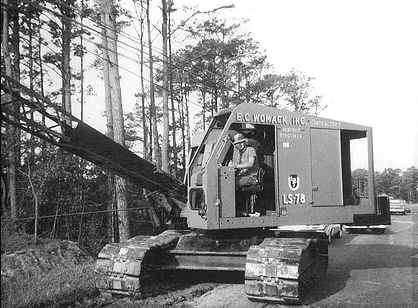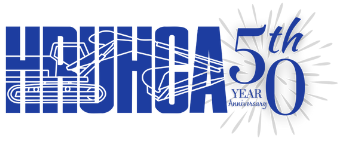Our History
History of the Hampton Roads Utility and Heavy Contractors Association
In 1974, the heavy construction industry in Hampton Roads was growing as quickly as the many municipalities that comprised the area.
The Cities of Virginia Beach and Norfolk were well underway to becoming part of the“Golden Crescent” of Virginia that stretched from Washington D.C. through Richmond and down to the Southeastern Virginia beaches.
Newport News and Hampton were enjoying a surge in development. Anheuser-Busch had come to James City County. Counties were being “gobbled up” by cities.

Often it was unclear as to who called the shots on specifications when it came to construction contracts. Individual contractors, equipment dealers, and material suppliers recognized the need to have a common organization of construction concerns who could speak for the industry as a whole.
Nineteen construction firms (see inset) formed the Tidewater Utility Contractors Association in 1974 as a non-profit group, a voice speaking out on behalf of their growing ranks.
Founding member Jerry Womack of Suburban Grading and Utilities, said that the “status quo” was hard to change: “At first there weren’t many changes [from municipalities]. We still ran into problems with cities and counties. Then about three or four years down the road they realized we weren’t going away.
Respect for the association began to grow. In addition to the growing respect from municipal entities, the association began to receive acceptance from the construction community, and the number of members started to also grow.
Gorman Pinkston of Pinkston & Sons was the group’s first president (right), followed in succession by Emil Viola of Vico Construction, Lewis Witt of Inner-View, Ltd., and Bob Meads of LMR Construction. Jerry Womack of Suburban Grading and Utilities was the Association’s fifth President.
With a large number of members, TUCA was able to influence municipalities into making changes in materials and specifications that greatly improved the production and performance of underground utilities.
“For instance,” said Jerry Womack in a 1999 interview, “in the beginning everything had to be clay pipe. We were able to convince municipalities to allow PVC pipe. We were also able to convince municipalities that pre-cast manholes were preferable to hand-built brick and block manholes, pre-cast inverts, etc.”
TUCA’s next step was a natural progression to broaden its scope of influence. Site-developers wanted contractors who could give them a turn key package that included excavation, clearing, underground utilities, curb and gutter, and roads.
TUCA saw the need to “re-brand” the organization to both expand their region of influence to include the entire Hampton Roads region, in addition to expanding their territory, TUCA needed to welcome contractors who performed work in addition to underground utilities.
In 1989, TUCA decided to change their name to the Hampton Roads Utility & Heavy Contractors Association (HRUHCA).
With a new brand, a large number of members, and a growing acceptance among the municipalities as a valued industry partner, the association hit “full stride” and HRUHCA made great inroads with local municipalities for its members.
“The founding principle of TUCA was to be a voice for those of us in the utility end of the construction industry,” said past-president Norm Slagle of Vico Construction (another founding member), “and we built membership by sharing results of industry achievements.”
Perhaps the most significant accomplishment that HRUHCA influenced was the creation of The Hampton Roads Regional Construction Standards.
With each locality using a different set of standards, and some small localities having none at all, staying on top of the requirements of each job was often a monumental task for contractors and design consultants.
As Richard Hartman, former director of public works and city engineer for the City of Portsmouth said in a 1997 interview; ”It was the contractors (HRUHCA) who started talking about regionalism, and now the municipalities are starting to listen.”
In 1999, after many discussions, meetings, and strategy sessions with industry partners, a group composed of representatives from Hampton Roads governments, utilities and contractors came together with a common goal, to develop one set of regional construction standards for everyone to use.
This regional standards have been a huge success and continue to provide a forum to this day for industry partners to improve local “specs”. The regional standards are in their fifth edition, and the standards committee is preparing the sixth edition for 2015.
The standards have been used by most every Hampton Roads municipality to construct over a billion dollars of infrastructure projects in our area since their inception.
HRUHCA has throughout its history given back to the community in which it members work. HRUHCA formed a college scholarship early in its history to help son’s and daughters of HRUHCA member firms afford a college education. This effort was boosted in 1997 when Allan Gibbs of Orion Associates assumed the chair of the Scholarship Committee.
Through Allan’s leadership and guidance, The HRUHCA Memorial College Scholarship Foundation was formed, and major memorial contributions were collected which has grown to the current level of $300,000.00. These contributions have helped to provide 75 HRUHCA sons and daughters over $110,000.00 in partial scholarship grants.
HRUHCA has been an active participant in the Virginia underground damage process through its participation with the Virginia State Corporation Commission (SCC), the regulatory agency entrusted with the task of managing provisions of the Virginia Underground Damage Prevention Act.
The Virginia Damage Prevention Act established an industry advisory committee thathears cases involving underground utility damage reports investigated by the SCC Division of Utility and Railroad Safety.
HRUHCA has had a long history of member firms participating as excavator representatives on the Miss Utility Advisory Committee.
Past-President Norm Slagle of Vico Construction and Charlie Adams of Suburban Grading and Utilities have served many years as our representatives. HRUHCA member Bill Witt, owner of WB&E Construction, currently serves as HRUHCA’s excavator representative on the SCC Advisory Committee.
HRUHCA has directly improved the Miss Utility process by suggesting new rules to help excavators in the field. Examples include a new rules that places time restrictions for utilities to contact excavators as to whether an underground utility line is “abandoned” or “live”.
In addition, HRUHCA recently influenced the SCC Advisory Committee to enact a new rule that eliminates the former “dig to China” law that mandated that excavators expose existing utility lines before crossing them no matter how deep they in the ground.These types of improvements have made our members jobs much easier in the field.
HRUHCA continues to monitor industry issues through its participation in the Virginia Utility and Heavy Contractors Council (VUHCC), our industry lobbying group in Richmond. HRUHCA has one of the most influential legislative representatives in Principle Lobbyist Whit Clement. Whit is a former Virginia Secretary of Transportation, former member of the Virginia House of Delegates, a partner in the Hunton & Williams law firm. He is consistently ranked by Virginia Business magazine as “One of the top 50 most influential people in the Commonwealth.”
The association has positively influenced important industry legislation on a number of important topics (trucking, overweight permits, safety issues, etc.) that directly impact our members. We continue to monitor important industry issues as they arise from boththe Virginia General Assembly as well as key industry regulatory agencies (Virginia DMV, VDOT, VOSH, SCC, etc.).
HRUHCA won a national award from the American Society of Association Executives (ASAE) in 2010 when members of HRUHCA provided time, labor, and materials to help build the site for the historic Great Bridge Battlefield Park. This initiative follows the many past efforts in which HRUHCA has given back to the region in which we live and work.
Throughout the history of the association, HRUHCA has monitored local industry issues that have directly impacted it’s members. When a contract locating company working for some of the largest utilities began to not show up to do their job, HRUHCA responded by bringing the attention to the public. The contract locator eventually pulled out of Virginia due to it’s poor performance and the negative publicity generated by the public exposure of their negligence in not marking projects properly or on time.
When many of our members were having delays in prompt payment and other pay item issues in contracts from the City of Norfolk, HRUHCA organized a meeting of many HRUHCA contractors who do business with the City and a number of the issues were resolved dueto the outstanding leadership of the City of Norfolk Department of Public Works and the realization that the items were outdated and needed to be changed.
When a member of the association came to HRUHCA about issues involving storm sewerinspection in the City of Virginia Beach, HRUHCA a series of meetings with the Virginia Beach Department of Public Works and were able to reduce the time it takes to get approval of storm sewers that saved our member firms months of potential delays.
The association has historically developed new ways to help our member firms with new services. The association now provides a full range of safety training classes and industry certification classes that allow our members to come to the office training room and not have to go long distances to take the classes.
HRUHCA currently teaches two certification classes for VDOT (temporary work zone and the ESCCC erosion and sediment control certification). In addition to these certification classes, we also teach a full range of industry-related OSHA safety classes.
The association also holds “lunch and learn” seminars throughout the year that help our member firms keep up to date with the most current industry issues affecting their businesses.
HRUHCA continues to evolve and find new ways to serve our industry and our members. We place great pride in continuing the culture of our founding fathers and founding members.
Through good times and bad, a small group of Hampton Roads contractors and suppliers banded together to form a common voice to address industry issues.
HRUHCA Board packages contain a quote from “The American Artisan” that states:
“If a trade is worth being in, it should be a privilege, if not a duty, to be a member of its association. Many of the trade benefits you enjoy today stem from the struggles and efforts of the association over the years.Other benefits – not yet foreseen can accrue to you in the future through active membership.”
The members of HRUHCA are proud of the association’s progress. They have continued to reap the benefits of past “struggles and efforts” for over forty years.

